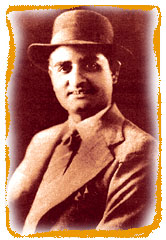K.L. Saigal
Saigal loved Urdu poetry and he created a new fusion of the music and the poetry. His musical interpretation of the ghazal gave a new form and content to the meaning of the verse. He played with words in a singular manner, producing an amazing array of emotions and sentiments. He seemed to share the joys and sorrows as spelt out in the words. In fact, like a magician, he succeeded in striking similar chords in the listeners' hearts. Many Urdu poets like Zauk, Seemab, Bedam, Arzu and Hasarat became famous, thanks to Saigal's rendition of their poetry. The great Mirza Ghalib was, however, the most favourite of Saigal. In his own inimitable way, Saigal immortalised Ghalib by singing his verses with his heart and soul, interpreting the deep meaning of every syllable. It is through Saigal that Ghalib gained vast popularity even with the non-Urdu knowing audiences. Again, it is Saigal's choice of Ghalib's ghazals which found place in the famous movie "Mirza Ghalib" produced by Sohrab Modi in 1954. Sung by Saigal, these ghazals continue to enchant listeners all over the subcontinent and abroad even to this day. Many other singers, both male and female, have sung 'Ghalib' but no one has been able to match Saigal, who identified himself with the poet's thoughts and feelings. No wonder, the most popular ghazals of Ghalib till today are those which Saigal sang during the 30s and 40s. It is a little known fact that Saigal himself was a poet and is said to have recited his own compositions. No recordings are, however, available except the one "Main baithi thi phulwari mein". In this song, written and composed by him, Saigal highlights the divine presence within every human being and points out that it is the inner voice which reveals this to us when we are frustrated with our search in the outer world. He speaks about the closing of one's outer eyes in order to awaken the inner vision for self-realisation. As a poet, Saigal knew how to give life-like imagery to his words. Music was his life and soul. He sang for himself, more like a Sufi saint, finding in music the most effective instrument for sublime communion with the Ultimate. A great artist, a great man, Saigal belongs to the class of human beings who defy death. He is immortal. The author is a noted freelance writer.
|
||||||||||||


